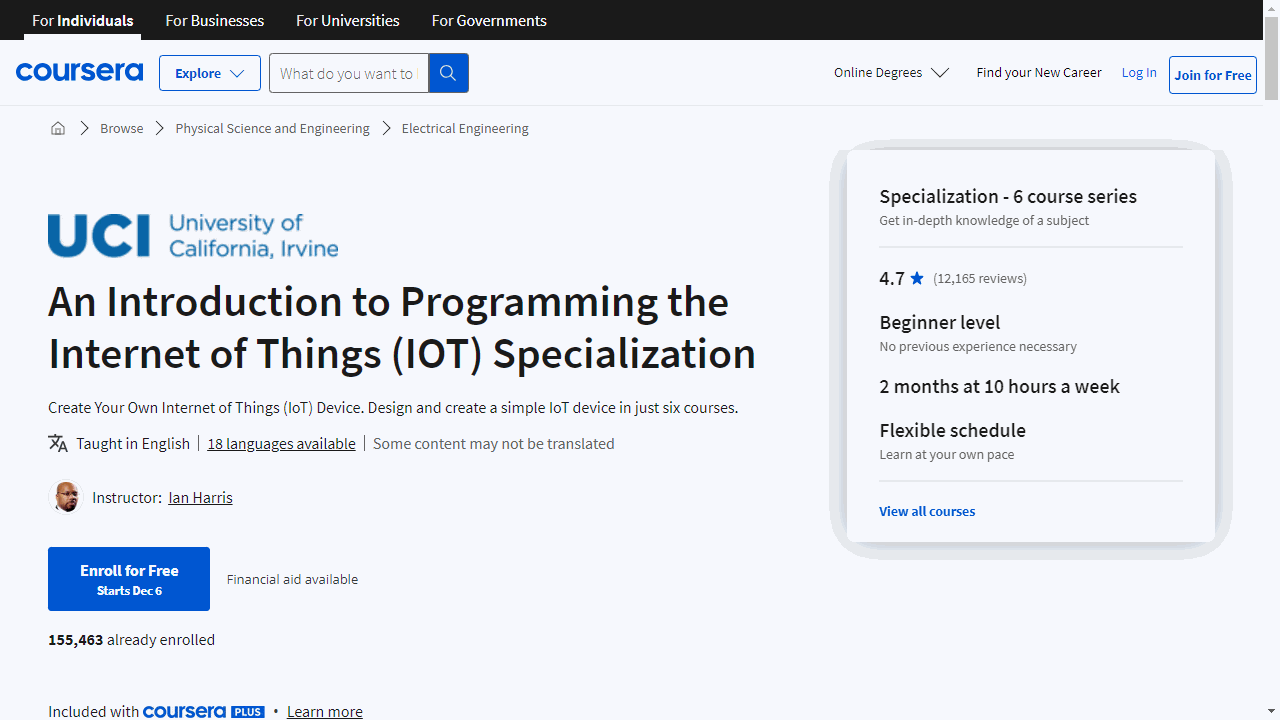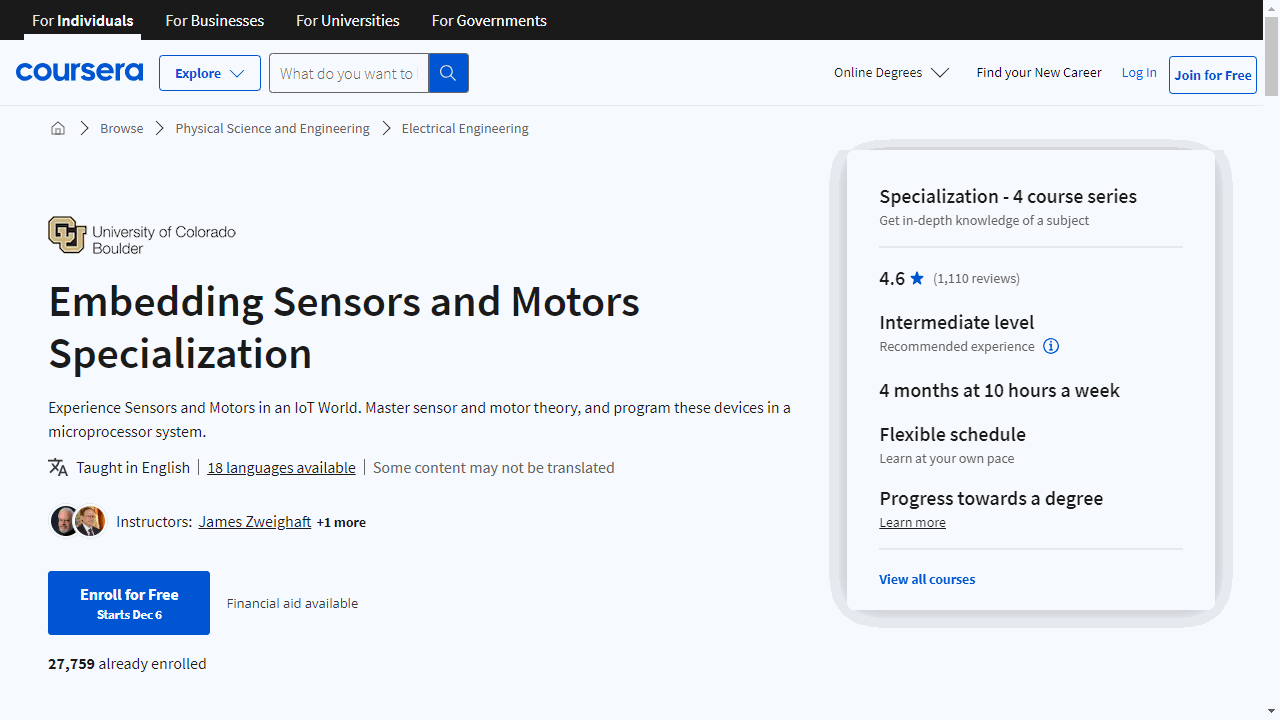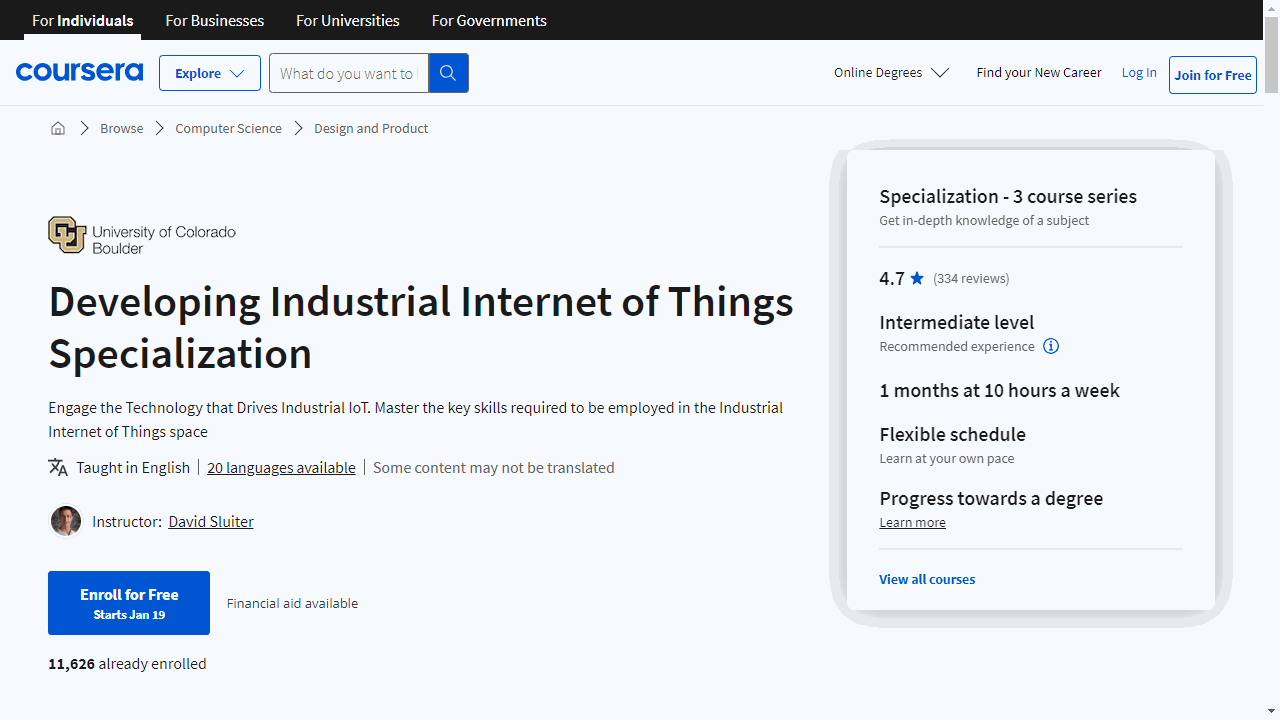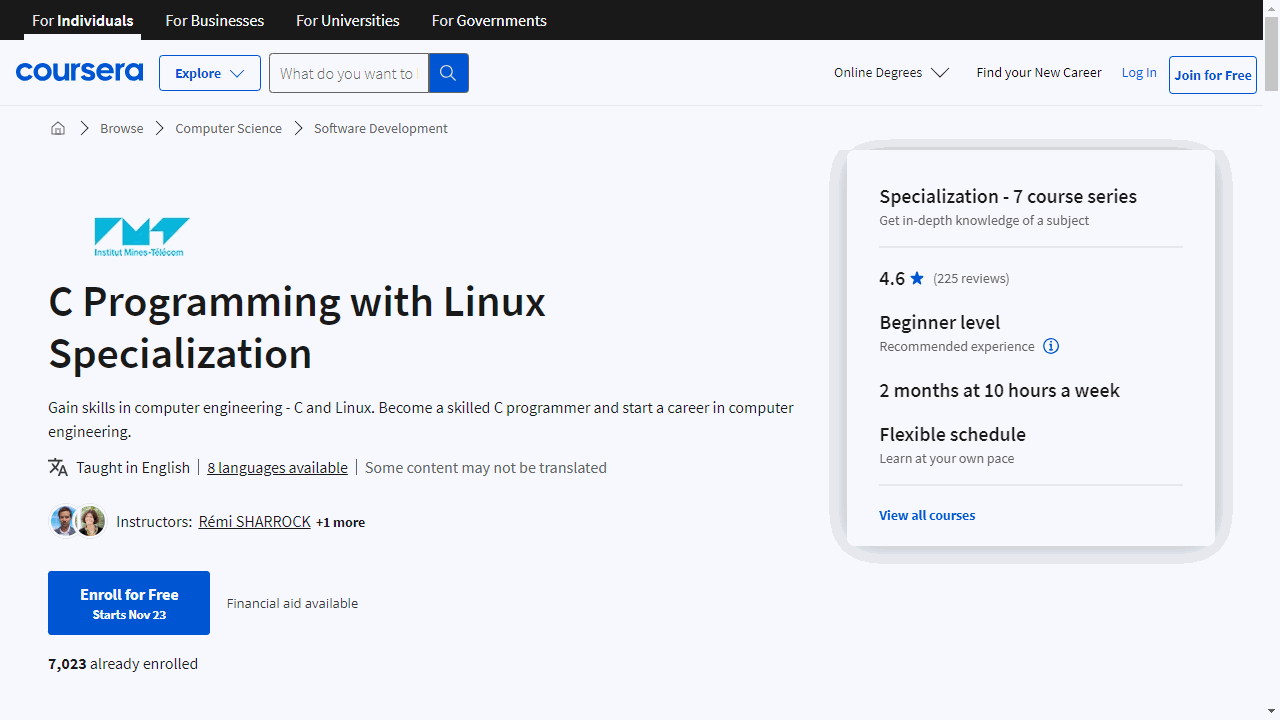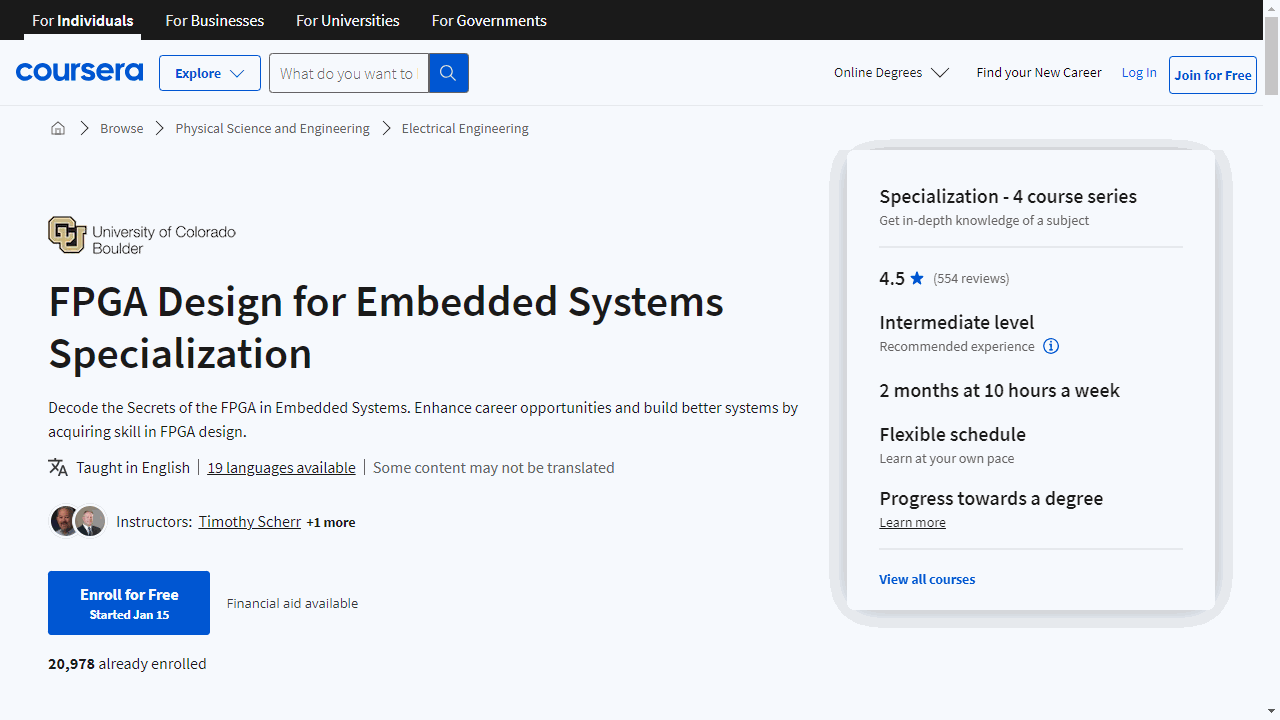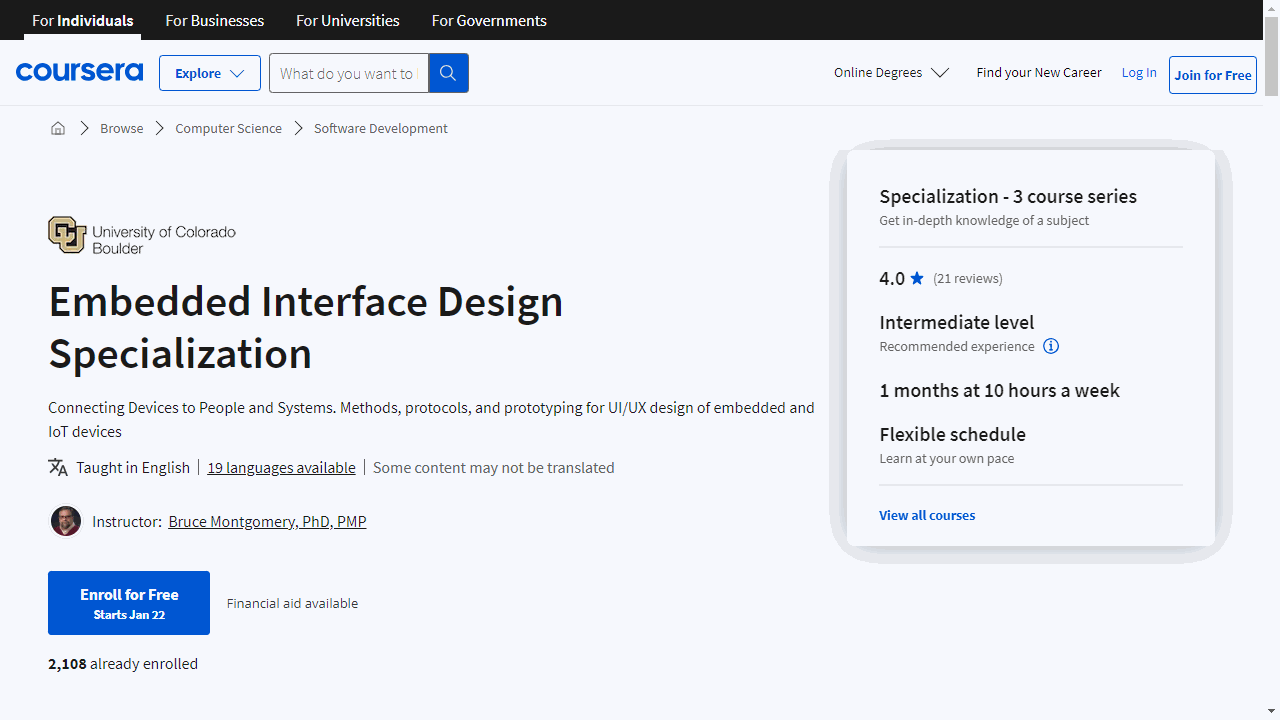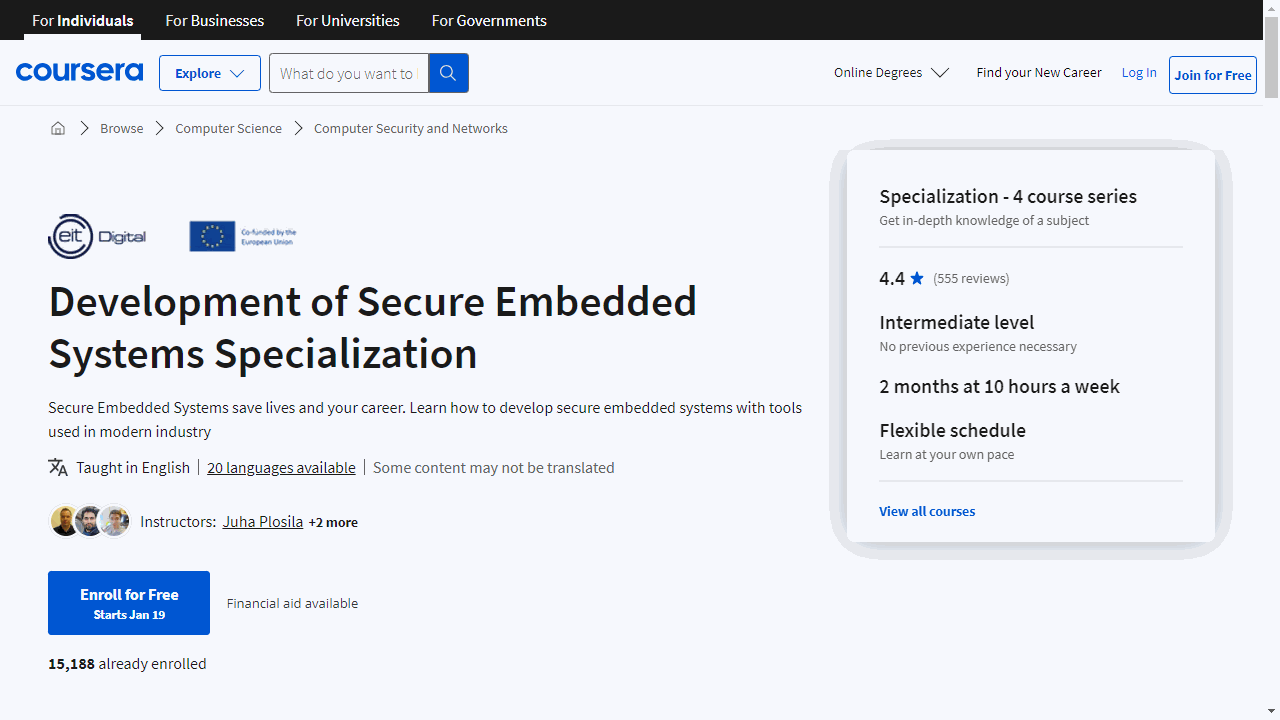Embedded systems are the brains behind many of the devices we interact with daily, from smartphones and smartwatches to cars and industrial equipment.
These systems integrate hardware and software to perform specific tasks, often with limited resources and strict real-time constraints.
Learning about embedded systems opens doors to exciting careers in fields like robotics, IoT, and automotive engineering, allowing you to create innovative solutions that shape the future.
Finding the right embedded systems course on Coursera can be a daunting task, with numerous options available.
You’re looking for a program that equips you with practical skills, covers essential concepts, and is taught by experienced instructors.
You want a course that can help you gain the confidence and knowledge to design and build your own embedded systems.
For the best embedded systems course overall on Coursera, we recommend “An Introduction to Programming the Internet of Things (IOT) Specialization” by the University of California, Irvine.
This specialization provides a comprehensive introduction to the world of IoT, focusing on practical applications and hands-on learning.
It covers essential concepts like embedded systems, Arduino programming, Raspberry Pi, and more, equipping you with the skills to build connected devices and applications.
This is just one of many excellent embedded systems courses available on Coursera.
Keep reading to discover other options tailored to different learning styles and career goals, including courses focusing on specific embedded systems platforms and technologies.
An Introduction to Programming the Internet of Things (IOT) Specialization
This specialization offered by University of California, Irvine equips you with the essentials of IoT and embedded systems, focusing on practical applications and hands-on learning.
The journey begins with “Introduction to the Internet of Things and Embedded Systems,” where you’ll grasp the significance of IoT and its societal impact.
You’ll learn about the components that make up IoT devices, including interfacing with the physical world and networking basics.
Skills in Arduino and Python programming are key takeaways.
Moving on to “The Arduino Platform and C Programming,” you’ll get familiar with the Arduino board, understanding its hardware and software aspects.
You’ll also learn to program in C, manage input and output pins, and use shields for expanded functionality.
In “Interfacing with the Arduino,” the focus shifts to connecting sensors and interpreting signals.
This course is crucial for learning how to make your devices interact with their environment.
“The Raspberry Pi Platform and Python Programming for the Raspberry Pi” introduces you to this compact computer.
You’ll set up the Raspberry Pi, run Linux, and execute Python code, gaining valuable programming and hardware knowledge.
“Interfacing with the Raspberry Pi” builds on this by teaching you to communicate with external devices using various protocols.
This course is essential for creating sophisticated IoT devices that can sense and act upon data.
The capstone, “Programming for the Internet of Things Project,” challenges you to design and potentially build a microcontroller-based system, integrating all the skills you’ve acquired.
Embedding Sensors and Motors Specialization
Provider: University of Colorado Boulder
This specialization offered by University of Colorado Boulder is part of a Master’s degree program.
Starting with “Sensors and Sensor Circuit Design,” you’ll gain the skills to select and implement various sensors into embedded systems.
You’ll learn to manage signal noise and integrate hardware with microprocessors for real-time data processing.
Essential components like the PSOC 5LP PROTOTYPING KIT and an oscilloscope are required, and you’ll find a detailed list of parts in the course content.
Moving on to “Motors and Motor Control Circuits,” you’ll deepen your understanding of motor selection and control.
This course emphasizes the practical application of motor equations and feedback data integration, essential for designing effective motor control circuits.
In “Pressure, Force, Motion, and Humidity Sensors,” you’ll explore a range of sensors and learn to incorporate them into embedded systems.
You’ll build circuits, develop low-level firmware, and process signals for accurate real-time monitoring.
Finally, “Sensor Manufacturing and Process Control” offers insight into the production of sensors and the intricacies of process control.
You’ll learn about sensor calibration, PID control, and manufacturing methods for electro-mechanical and micro-machined sensors.
You’ll need additional equipment like wires, a breadboard, and an oscilloscope, which are vital for the hands-on projects.
Remember to check the required parts list to fully engage with the course projects.
Developing Industrial Internet of Things Specialization
Provider: University of Colorado Boulder
This specialization targets the expansive and evolving field of the Industrial Internet of Things (IIoT), giving you a solid foundation in Industry 4.0.
Kick off with “Industrial IoT Markets and Security,” where you’ll grasp the essence of Industry 4.0 and the skills needed to thrive in the IIoT domain.
You’ll explore critical platforms, dive into market insights, and understand the significance of security, including encryption and data protection methods.
Move on to “Project Planning and Machine Learning,” where you’ll master project execution, learn to create detailed bills of materials, and delve into sensor technology.
The course also introduces you to the basics of machine learning and the importance of big data, setting you up for success in data-driven decision-making.
The third course, “Modeling and Debugging Embedded Systems,” hones your technical expertise.
You’ll work with SystemC for cyber-physical system modeling and gain a deeper understanding of embedded systems within the automotive sector.
Debugging skills are sharpened with tools like Lauterbach’s TRACE32, and you’ll learn the art of promoting technical ideas and analyzing engineering failures.
By completing this specialization, you’ll develop in-demand skills in automation, debugging, and embedded systems.
Whether you’re aiming for academic credit or building a career in IIoT, these courses offer practical knowledge and insights from industry experts.
C Programming with Linux Specialization
Provider: Dartmouth College, Institut Mines-Télécom
This specialization is designed to build a strong foundation in both C programming and Linux, two critical skills for modern tech professionals.
The journey begins with “C Programming: Getting Started,” where you’ll hit the ground running, coding directly in your browser.
This course simplifies the learning process, making it accessible even if you’ve never written a line of code.
You’ll learn to create basic programs, handle variables, and use loops to automate tasks.
As you progress to “C Programming: Language Foundations,” you’ll tackle logical statements and arrays, essential tools for data organization and decision-making.
This course also introduces you to algorithms for sorting and searching, skills that are transferable across many programming languages and highly valued in the tech industry.
In “C Programming: Modular Programming and Memory Management,” the focus shifts to functions and pointers, demystifying how memory is accessed and managed in C.
The course’s innovative tools help visualize these complex concepts, ensuring you understand pointers thoroughly, a topic often considered challenging by new programmers.
Building on this knowledge, “C Programming: Pointers and Memory Management” delves deeper into pointer arithmetic and dynamic memory allocation, empowering you to manage memory efficiently and write more sophisticated programs.
The fifth course, “C Programming: Advanced Data Types,” teaches you to define and manipulate your own data types.
This ability allows for more structured and efficient data handling, a skill that can significantly enhance the functionality of your programs.
“Linux Basics: The Command Line Interface” transitions your focus to Linux, the operating system that powers countless devices and servers worldwide.
You’ll become proficient in navigating the Linux file system and using command-line tools, a must-have skill for any serious developer.
Finally, “C Programming: Using Linux Tools and Libraries” rounds out the specialization by introducing you to the professional environment of C programming within Linux.
You’ll learn to utilize libraries, compile multiple source files, and automate building processes with makefiles.
By the end of the specialization, you’ll have a solid grasp of C programming, command-line proficiency, and the ability to work with Linux tools and libraries, setting you up for success in the tech industry.
FPGA Design for Embedded Systems Specialization
Provider: University of Colorado Boulder
This hands-on program equips you with the skills to design and implement complex electronic systems using FPGAs.
Kick off with “Introduction to FPGA Design for Embedded Systems,” where you’ll unravel the basics of FPGA technology.
You’ll learn to select the appropriate FPGA architecture for various applications and navigate through cutting-edge development tools.
Remember, you’ll need a Windows or Linux-based PC with at least 8 GB of RAM to get started.
Move on to “Hardware Description Languages for FPGA Design,” where VHDL and Verilog become your tools of the trade.
This course breaks down complex concepts into digestible chunks, ensuring you build a solid foundation in these critical hardware description languages.
In “FPGA Softcore Processors and IP Acquisition,” you’ll delve into soft processors and IP within FPGAs.
You’ll craft your own soft processor, integrate IP blocks, and validate your designs using tools like ModelSim for simulation.
The finale, “FPGA Capstone: Building FPGA Projects,” is where theory meets practice.
You’ll need a DE10-Lite development kit to design, test, and debug actual FPGA projects.
By the end of this course, you’ll have a comprehensive understanding of the FPGA development flow, from conception to implementation.
Throughout this specialization, you’ll gain proficiency in digital design, simulation verification, and software design for softcore processors.
You’ll also become adept at using Quartus Prime for programming and debugging, and you’ll familiarize yourself with the Nios II soft processor and various peripherals.
Embedded Interface Design Specialization
Provider: University of Colorado Boulder
This set of three courses is your ticket to mastering interface design for embedded systems.
Kick things off with “UX and Interface Design for Embedded Systems,” where you’ll learn to create interfaces that users need and want.
You’ll tackle everything from user research to design and testing, with a special focus on the quirks of embedded devices.
Hands-on projects will help you practice key methods and understand user interaction with embedded components.
Move on to “Rapid Prototyping of Embedded Interface Designs” to learn how to quickly turn your ideas into working prototypes.
You’ll get practical experience with Qt and HTML, crafting user interfaces that are both functional and appealing.
This course emphasizes the importance of effective GUI design and helps you navigate the choices for operating systems in embedded devices.
Wrap up with “M2M & IoT Interface Design & Protocols for Embedded Systems,” where you’ll connect devices using IoT and M2M.
You’ll explore cloud services like AWS, tackle communications protocols, and address IoT design concerns like security.
Projects in this course will have you using AWS, Python, and Node.JS to develop prototype interfaces that are cloud-connected and efficient.
By the end of this specialization, you’ll have honed skills in UX and UI design, project planning, and rapid prototyping.
You’ll be ready to design interfaces that are not only user-friendly but also integrate seamlessly with the Internet and other devices.
If you’re aiming to become an expert in embedded interface design, these courses are precisely what you need.
Plus, they count towards academic credit for CU Boulder’s Master of Science in Electrical Engineering degree, giving you an extra edge in your career.
Development of Secure Embedded Systems Specialization
Provider: EIT Digital
This specialization is a comprehensive journey through the essentials of creating secure, efficient embedded systems, crucial in the IoT era.
Start with “Embedded Hardware and Operating Systems,” where you’ll explore the core components of cyber-physical systems.
You’ll gain hands-on experience with Cooja simulation, allowing you to design and simulate your own sensor network applications.
If C programming is new to you, a linked course will help you get started.
In “Web Connectivity and Security in Embedded Systems,” you’ll tackle the challenge of networking and securing devices.
You’ll learn to craft network architectures for cyber-physical systems and implement security measures to safeguard them against threats, ensuring your systems are both connected and protected.
“Development of Real-Time Systems” shifts your focus to the critical aspect of timing in embedded systems.
You’ll delve into scheduling algorithms and the use of FreeRTOS, ensuring your systems meet stringent real-time requirements.
This course blends theoretical knowledge with practical programming assignments for a well-rounded learning experience.
The capstone project, “Autonomous Runway Detection for IoT,” is where you apply your accumulated knowledge.
You’ll develop a comprehensive system, integrating lessons from the previous courses, and evaluate its performance in a real-world context.
This project will challenge you to consider efficiency, correctness, and practical factors like energy consumption and cost.
Taught by experts from the University of Turku and Åbo Akademi University, this specialization equips you with skills in IoT, embedded operating systems, real-time systems, and more.
You’ll emerge with the ability to innovate and iterate embedded systems that are smart, secure, and responsive.
